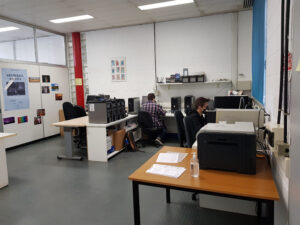Digital Content Analysis is a wide term related to the application of algorithms, methods and techniques for generation of information and knowledge starting from data of any kind: images, video, georeferenced visual maps or big data from the Web.
The laboratory aims to host researchers, graduates for research activities to obtain a doctorate and students for the development of their thesis work.
The tools and equipment, both hardware and software, necessary for students to carry out thesis or research activities for the doctorate are available in the DCA laboratory.
The main research activities are carried out in the context of:

High-performance computing (HPC) technology applies the power of supercomputers or computer clusters to solve complex problems that needs massive computation.
These HPC systems might be used to run programs that require processors that can execute instructions faster than standard computers, sometimes using multiple processors in parallel architectures or supercomputers to obtain results in a reasonable time..
For more information check Prof. Marco Ferretti website
Data science is a branch of research strongly linked to Artificial Intelligence. This area is specifically focused on the elaboration and development of models for data analysis with the aim of extracting knowledge, in terms of information content, which can then be used as input in other industrial and research contexts. Leveraging the most modern technologies in the context of machine learning and deep learning, DCALab researchers develop solutions for the analysis of heterogeneous data sources with characteristics typical of the “Big Data” context.
AI-DRIVEN CYBERSECURITY and PRIVACY:
Preserving a focus on information management and processing, the DCALab embraces aspects of cybersecurity and privacy.
In particular, the laboratory has often focused on the definition of privacy-preserving models for the use and exchange of services in the context of the Internet of Things (IoT).
Furthermore, strategies have been developed to protect the interaction between digital entities using behavioral fingerprinting approaches.
Finally, DCALab researchers study innovative solutions to improve the reliability of distributed approaches related to data analysis and processing such as, for example, Federated Learning strategies. In particular, the vulnerabilities introduced by these approaches and the definition of solutions for their protection from cyber attacks are studied.
Computational Sustainability, is a recent interdisciplinary field of science that aims at developing methods, models, and indexes to balance economic, social and environmental needs for a real sustainable development .
For more information, check Prof. Albanesi website of the Computational Sustainability Unit (CSU)
Contact us for further information, doubts and clarifications, about Dcalab activities and engagement.
